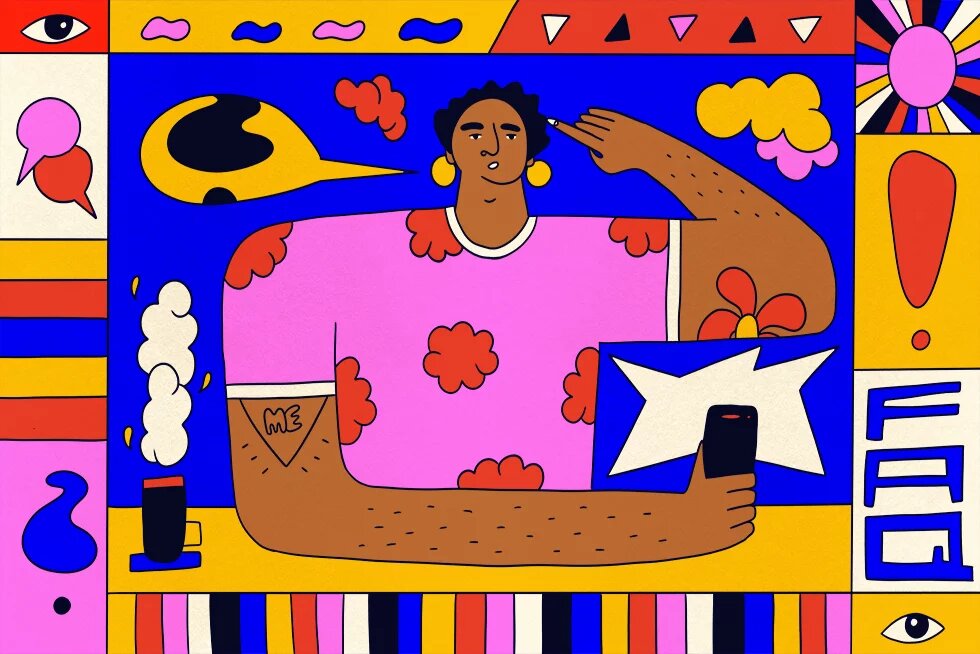Statements we encounter in conversations about left-wing identity politics which it is important to respond to.

1) “Identity politics makes the differences between people even greater, divides society and is therefore counterproductive”
The discussion about identity politics is a lot younger than the debate about differences with regards to gender, racism or disability. People with characteristics that don’t conform to the prevailing norm in a given situation, such as being perceived as Black, disabled, queer or poor, were defined as ‘different’ and ‘not normal’ and made into ‘the Other’ by the respective majority society over the course of the past centuries. In the process, qualities were assigned value judgements, that emphasise and hierarchise differences or rather, Otherness.
This is always accompanied by structural ostracising or even the exclusion of these groups from different areas of society, such as culture, education or politics. Laws can also serve to disadvantage and exclude certain social groups. Rules, norms, conventions or traditions assign particular groups privileges and advantages, while others are put at a disadvantage.
The good news is: Norms, rules, laws and traditions can be changed. Without the struggle of marginalised peoples and groups, who confidently take a stand against discrimination and ostracism and advocate for participation and rights, there are generally no emancipatory changes. To end discrimination or even the criminalisation of marginalised peoples and groups, these emancipatory struggles and alliances are needed.
This means that in the context of progressive identity politics, it is precisely a matter of not making these differences greater, but smaller, and eliminating them. When injustices, discrimination and exclusion can be named and then done away with, we come closer to our goal: equal participation, for instance, through access to resources and the participation of all people living in this society.
Against the backdrop of common experiences of discrimination, those affected, for example Black people and People of Colour (PoCs), or queer people, get together to exchange ideas, produce knowledge, to refuel and to formulate their political demands. This is to be understood as a reaction to discrimination and does not serve to divide them from the rest of society. Progressive identity politics is therefore aimed at engendering justice. The frequent insinuation that those discriminated against divide society, deploys a prevalent pattern of the reversal of blame.
Talking about both commonalities and differences is important! We need a rhetoric of commonality that recognises specific experiences of discrimination.
Identity politics can be politics with a vision, because the following questions may be derived from it: Where do we want to go? Who should have a say? How do we want to live alongside each other?
2) “This all plays into the hand of the right-wing”
Right-wing identity politics essentialises. This means that positive or negative characteristics are attributed to people based on religious affiliation, gender and descent. This is supplemented with nationalist perspectives that deny people who are both German and Turkish for instance, affiliation with Germany. In the process, white Germans, who have been living in Germany for generations and do not have or maintain cultural connections in other countries, are stylised as superior and as belonging here. The same pattern is deployed for people with visible disabilities: They are devalued as less worthy, less useful, and therefore, a burden to society. It is essentially a matter of ostracising through the attribution of negative characteristics.
Progressive identity politics, however, is not aimed at classifying people according to identity markers. Rather the focus is on experiences of discrimination.
These experiences are not dependent on whether people themselves identify as part of a particular group. Nonetheless, their experience makes them part of a group with whom they share these experiences.
Therefore, progressive identity politics is often accused of also essentialising and itself leads to a general devaluation of other people. Then it is worth emphasising that progressive identity politics is geared towards dissolving these experiences of discrimination. This means that experiences of discrimination are currently a social reality and therefore also a shared experience. In a utopian society of equal participation, however, this social reality dissolves and with it, the shared experience of groups discriminated against.
The demand for the social participation of marginalised groups of people is a reaction to discrimination – especially from the right-wing – not its cause. It is the prerequisite for a diverse society.
3) “It only leads to bans on speech”
In debates on identity politics, it is often claimed that these would lead to bans on speech. Yet the debate around social structures of power, exclusion and representation, and what can be said, is productive for a start: they are criticised, stereotypes are called into question and marginalised voices are heard. It is democratic progress we urgently need.
In recent years, more and more people with a variety of experiences of discrimination have used the opportunity to organise themselves and to make their perspectives and political demands visible. Black voices clearly state what is racist, inter, trans and non-binary voices that there are more than three genders – to name a few examples. In the process, demands and aspirations are formulated: for instance, for the more respectful and inclusive use of language.
Studies show that some people feel threatened when people who have been excluded thus far demand equal rights.[1] These demands call their “internalised dominance” into question.
The consequences are often defensive behaviour and uncertainty, leading to the assumption that one is ‘no longer allowed to say anything’. This doesn’t mean that people who belong to the norm, e.g., white people, are not allowed to contribute anything to debates on racism. Yet they should be interested in an examination of their privileges and open to criticism around the reproduction of exclusion. Social exchange around this topic is important. Privileged people in particular have to address exclusion and how it can be confronted.
But if it is exclusively or a majority of people who belong to the norm talking about the concerns of marginalised groups, the absence of the perspectives of those affected must be named – together with the dangers that accompany this. When representatives become loud here, it is not a ban on speech, but an intervention in order to have a say.
For people who belong to the norm, it may feel a little unfamiliar to be reminded that their perspective is not the only one or the priority. Perhaps it is pointed out to them that their perspective is also part of a discriminatory structure. This can unsettle people and give them the feeling that they can no longer ‘freely’ say – that is, without fearing the consequences –what they think. Yet it is not about making no mistakes, but much more about acknowledging them and responding to constructive criticism with gratitude.
One thing is certain: Talking about exclusion and discrimination is something we all have to practice together!
4) “Do I have to be ashamed of being white and heterosexual now?”
For many (multiply) privileged people, having their own privileges named is unfamiliar and unpleasant for starters, and can lead to a feeling of shame arising. Referring to white and hetero privileges, or admitting to these yourself, does not mean you generally have it easy in life or have no other experiences of discrimination, e.g., due to a disability or a social background. People are very complex and privileges and advantages can exist parallel to experiences of discrimination.
Addressing privileges on the account of being white or heterosexual, or becoming aware of them, does not ignore other experiences of discrimination, rather it helps to view your own position in a differentiated way, to reflect on your own experiences in the context of discrimination and thus become more capable of action.
To overcome shame, it is important to direct your focus to your own responsibility: I have certain privileges. That means certain resources are easier for me to acquire and I can use these for more just cooperation, hold back at certain points, vouch for other people, or redistribute resources.
5) “Ultimately, we’re all only human, why make a difference at all?”
In order to draft certain laws for the participation of all people in society, to dismantle barriers etc., it is necessary to name the differences between people, on a structural/societal level. It is not the aim of left-wing identity politics to create or reinforce differences between people, but to name existing differences, with the aim of dismantling inequalities.
It does not make sense to provide everyone with the same means if they cannot all be used in the same way, or if others do not need these means at all. It is also useful to be aware of the differences between people and thereby, different needs and requirements, in order to develop good strategies for participation for everyone.
If we were to assume that there are no differences, it would be very difficult to term discrimination, to take action against it and to scrutinise relationships of power. We need an awareness of the marginalisation of different groups as a basis for equal participation.
Furthermore, for many marginalised groups naming their positioning is also about bringing about self-empowerment, with shared experiences as the starting point.
Negating differences doesn’t carry us any further in the struggle against discrimination and for more participation. As such, it is important to ‘train’ one’s own perception and mentioning of differences: When is it important to point out differences and name them? When does it not matter, or rather when is it not productive or even detrimental? Together we have the task of always asking ourselves these questions, of reflecting on them and accepting the uncertainties within them.
6) “You should worry more about the ordinary cashier in the supermarket…”
Disadvantage and discrimination on the basis of social status has been and is, unfortunately given little consideration in many debates on exclusion. Classicism, so discrimination on the basis of social background, humiliates, devalues and prevents social participation. For this reason, consideration of social status cannot be omitted in progressive anti-discriminatory politics and identity politics. It is actually immensely important. Social background is a very complex and multi-layered category. Both the level of education and socio-cultural norms (such as clothing, way of speaking, taste in music), as well as financial status/ wealth characterise a person’s social background, and thereby their opportunities and experiences of discrimination.
In the examination of and conversations around discrimination, the consideration of social background should play an important part, as this is very often characterised by the interaction between different forms of discrimination: A female cashier in a supermarket, for example, is also affected by sexism or, if she is Black or a person of colour, experiences of racism may also play a role. When we look at the labour market, it quickly becomes obvious how important an intersectional perspective is that takes social background in interplay with other categories into account: Both women and people with a migrant background are overrepresented in the low-wage sector and people with disabilities are refused access to the labour market owing to lack of accessibility or other stereotypical attributions. For example, 46.9 percent of people with severe disabilities were employed in 2017, while the employment rate of the general population was at 75.3 percent.[2]
It is important that there be no hierarchy of forms of discrimination, even if prioritisation can be useful depending on the context.
We cannot consider different markers of identity, on the basis of which experiences of exclusion are made, separately from one another and must always take account of the context in which they occur. So, it is just as much about the cashier in the supermarket, as it is about the person in the wheelchair, who has no access to the polling station because of structural barriers.
7) “I myself never really pay attention to people’s skin colour…”
In discussions around racism, some people claim that they “don’t see skin colour”, that they “make no difference” between people, or that to them, all people are equal. The idea that racism can be overcome if all people were to be treated equally, or if racism were not addressed, often underlies this stance. This perspective is problematic because it ignores the structural disadvantages of people who experience racism. At the same time, this attitude on the part of white people can lead to ignoring racism along with its far-reaching consequences for Black people and People of Colour, because they do not experience exclusion in the context of racism. On the contrary, racism can give white people advantages in society. This includes, for instance, comparatively easier access to the labour and housing markets, to education, political participation and representation or even healthcare. When this stance fails to recognise structural racist discrimination and does not name it, it contributes to its preservation. If structural racist discrimination is misjudged and not named, it reinforces the preservation of discrimination. If we want to oppose racism, we have to perceive the differences it creates.
8) “But the real bad ones/enemies are…”
In the context of discrimination, a division into ‘the good ones’ and ‘the bad ones’ is not helpful. Because discrimination is structural and is thus manifested in interpersonal relationships, works in rules, measure and legislation, and is passed on through socially shared knowledge, we cannot escape discriminatory ideas. We learn them from an early age. Granted, there are people who want to deliberately exclude people with their actions. Even ‘good intentions’, however, cannot protect us from discriminating against people in different ways. It also follows that even those who make a serious effort to dismantle discrimination are often not above criticism.
Criticism of discrimination and thus ultimately identity politics that is left-wing/ critical of power and progressive, knows no ‘enemies’. Commitment to human rights, which in particular focuses on those whose rights are not respected, is always access to human rights for all. The objective is the end of all forms of oppression. To achieve this objective, it is important that we see feedback on our behaviour as opportunities to reflect on it and at least do something different next time. So, feedback is welcome!
[1] Studies:
- John T. Jost, Erik P. Thompson (2000): Group-Based Dominance and Opposition to Equality as Independent Predictors of Self-Esteem, Ethnocentrism, and Social Policy Attitudes among African Americans and European Americans, Journal of Experimental Social Psychology, Volume 36, Issue 3, 2000, Pages 209-232, ISSN 0022-1031, link: https://doi.org/10.1006/jesp.1999.1403.
- Pheterson, G. (1986). Alliances between Women: Overcoming Internalized Oppression and Internalized Domination. Signs: Journal of Women in Culture and Society, 12(1), 146–160. doi:10.1086/494302
- Jansen, L., Weber, T., Kraaykamp, G., & Verbakel, E. (2016). Perceived fairness of the division of household labor: A comparative study in 29 countries. International Journal of Comparative Sociology, 57(1-2), 53–68. doi:10.1177/0020715216642267
[2] Federal Employment Agency: Bericht Arbeitsmarktsituation schwerbehinderter Menschen 2020

